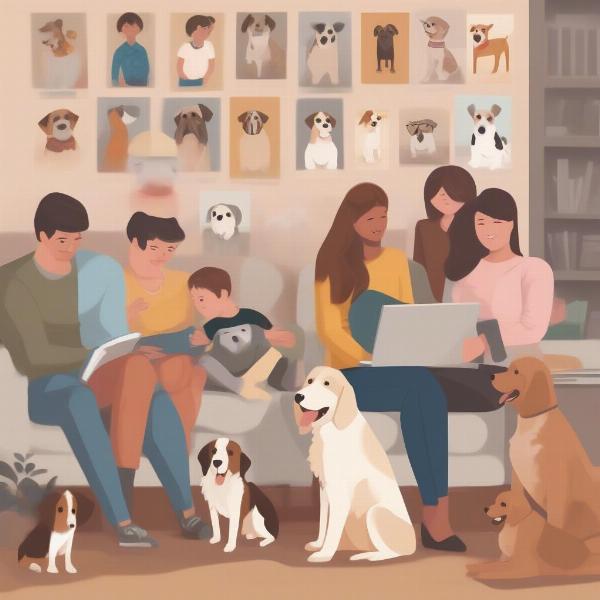“Oooh my dog!” is a common exclamation, often uttered in adoration or surprise. Whether you’re a seasoned dog owner or just starting your journey, understanding your canine companion is key to a happy and fulfilling relationship. This guide provides practical advice and expert insights on all aspects of dog care, from choosing the right breed to navigating senior dog care.
Choosing the Right Breed for Your Lifestyle
Selecting a dog breed is a big decision. Consider your living situation, activity level, and personal preferences. A small apartment might be suitable for a Chihuahua, while a large active breed like a Labrador Retriever thrives in a house with a yard and plenty of exercise. Research different breeds thoroughly to find the perfect match.  Choosing the Right Dog Breed Do you have children? Some breeds are known for being particularly good with kids, while others might be more suited to a home with adults.
Choosing the Right Dog Breed Do you have children? Some breeds are known for being particularly good with kids, while others might be more suited to a home with adults.
Dog Health and Medical Care
Regular veterinary checkups are crucial for preventative care. Vaccinations, parasite prevention, and dental care are essential for maintaining your dog’s health. Don’t hesitate to consult your veterinarian if you notice any changes in your dog’s behavior or appetite. Early detection of health issues can significantly improve outcomes.
Training and Behavior
Positive reinforcement training methods are the most effective and humane way to train your dog. Consistency and patience are key. Start with basic commands like sit, stay, and come. Socialization is also crucial, exposing your dog to different people, places, and situations from a young age helps them develop into well-adjusted adults. Remember, training is an ongoing process.
Nutrition and Feeding
Providing your dog with a balanced diet is essential for their overall well-being. Choose a high-quality dog food appropriate for their age and breed. Avoid feeding table scraps, as many human foods can be toxic to dogs. Freshwater should always be available.
Grooming and Hygiene
Regular grooming keeps your dog clean and comfortable. Brushing helps remove loose fur and prevents matting. Bathing frequency depends on the breed and lifestyle. Nail trimming and ear cleaning are also important aspects of grooming.
Exercise and Activities
Dogs need regular exercise to stay healthy and happy. The amount and type of exercise depend on the breed. Daily walks, playtime in the park, or even engaging in dog sports can provide physical and mental stimulation.
Puppy Care
Puppies require extra care and attention. Housebreaking, crate training, and socialization are crucial during this stage. Provide them with a safe and stimulating environment to explore and learn.
Senior Dog Care
As dogs age, their needs change. They might require more frequent vet visits, a modified diet, and adjustments to their exercise routine. Providing a comfortable and supportive environment is essential for their well-being.
Traveling with Your Dog
If you plan to travel with your dog, make sure to plan ahead. Research pet-friendly accommodations and transportation options. Pack essential supplies like food, water, and medications.
Dog Products and Accessories
From collars and leashes to toys and beds, a wide range of dog products are available. Choose products that are safe, durable, and appropriate for your dog’s size and breed. Remember, quality over quantity is often the best approach.
Conclusion
Caring for a dog is a rewarding experience. By understanding their needs and providing proper care, you can build a strong and lasting bond with your furry companion. “Oooh my dog!” will be an exclamation of joy and love, reflecting the deep connection you share.
FAQ
- How do I choose the right dog food? Consider your dog’s age, breed, and activity level. Consult your veterinarian for recommendations.
- How often should I groom my dog? Grooming frequency depends on the breed and coat type. Consult a groomer or your veterinarian for guidance.
- How do I housebreak my puppy? Establish a consistent routine, reward successful potty breaks, and be patient.
- What are the signs of a sick dog? Changes in appetite, behavior, or energy levels can indicate illness. Consult your veterinarian if you have concerns.
- How can I make my senior dog more comfortable? Provide a soft bed, easy access to food and water, and regular veterinary checkups.
- What are the essential supplies for traveling with a dog? Food, water, medications, leash, collar, and a comfortable carrier.
- How do I choose safe dog toys? Select toys that are durable and appropriate for your dog’s size and chewing habits.
Suggested Further Reading:
(If there are related articles on the website, include links here. If not, omit this section.)
About ILM Dog
ILM Dog is your trusted resource for comprehensive dog care information, providing expert advice on breed selection, health and medical care, training, nutrition, and much more. We offer practical tips and resources to help you navigate every stage of your dog’s life. For personalized guidance or inquiries, reach us at [email protected] or call us at +44 20-3965-8624. Let ILM Dog help you provide the best possible care for your beloved canine companion!